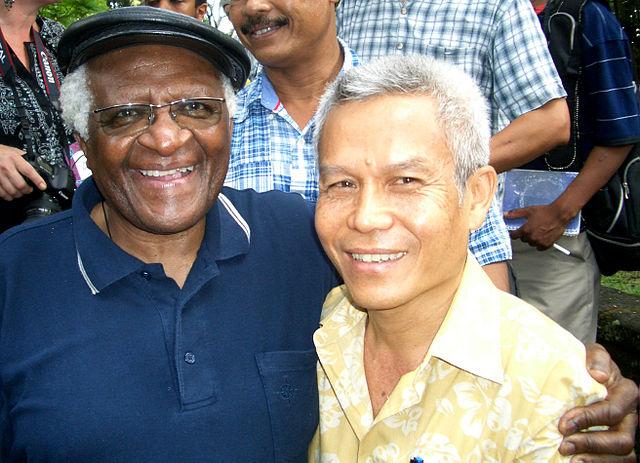Environmental activists under increasing attacks as natural resources diminish
Sombath Somphone, right, with Desmond Tutu, is an internationally respected community development worker from Laos, who’s Dec. 2012 abduction has drawn international concern. (Photo by Shui-Meng Ng via Wikimedia Commons).
As natural resources diminish around the world, environmental activists increasingly face increasing threats for taking a stand for the environment. International nongovernmental organization Global Witness estimates that the number of murders of econivornmental activist has increased to more than two per week.
“In other words, more than 100 over a year, which is more than double what they were logging over a decade ago,” says journalist Fred Pearce, who reported on the subject for Yale Environment 360. “So it really doesn’t look good.”
One of the most dangerous places for environmental activists is Brazil. Last year on the last day of the Rio+20 Earth Summit in Rio de Janeiro, two activists were brutally murdered while fishing.
“Those two people were activists in a group trying to prevent the laying of a new pipeline for natural gas and a new refinery that they believed would disrupt fishing. They were part of a group representing local fishing communities trying to prevent these industrial developments,” says Pearce.
The murderers have not yet been apprehended.
The Philippines is also considered extremely dangerous for environmental activists. A number of priests in the Catholic Church who were prominent in social activism have been killed in recent years, Pearce says. Margarito Cabal, a civil servant who was against a hydroelectric dam project on the southern island of Mindanao, was killed one month before the murders in Brazil.
“[He] was simply gunned down by someone on a motorbike after he had just come back from a village that was engaged in the protest against the dam,” Pearce says.
The culprit is still unknown but there had been a lot of tension in the area because a local military brigade was arresting people who they believed to be criminals.
In recent years, Cambodia has also become more dangerous for environmental activists because of an increase in illegal logging. An activist named Chut Watty, who worked for Global Witness and other organizations, was taking journalists from the capital Phnom Penh to look for illegal loggers. They found illegal loggers in the remote west of Cambodia who appeared to be supported by government soldiers or security personnel, Pearce says, but before they knew what they were seeing, Watty was killed and the journalists fled. The case never went to court and Watty’s death “sent a chill” through the environmental and social activism community in Cambodia.
On a global level, the increase of environmental activist deaths might be linked to increased concern over natural resources as companies try to move in. Pearce says the acticits are not always without fault, but “in the main, these are people who are peaceful, who are active in trying to help communities peacefully defend their resources.”
Drawing international concern to these attacks could help protect environmental activists in the future, Pearce says.
“If we’ve shined the light of international publicity on these sometimes heinous crimes, then I think there is a prospect to making people who are thinking of doing these things much more wary about the possible consequences,” he says.
